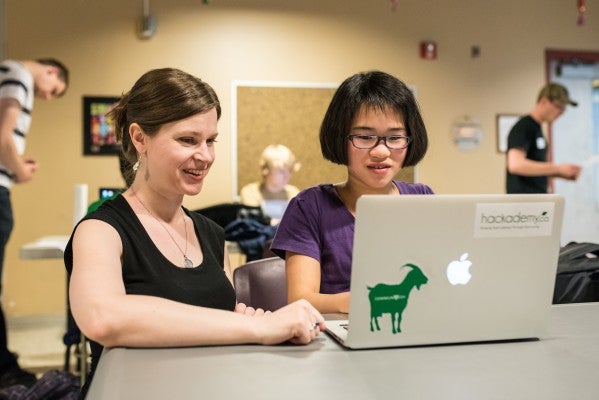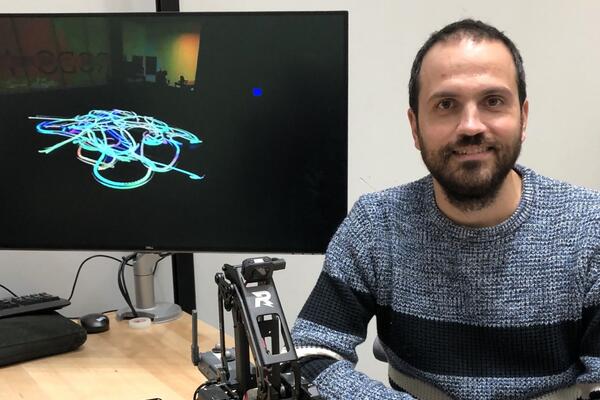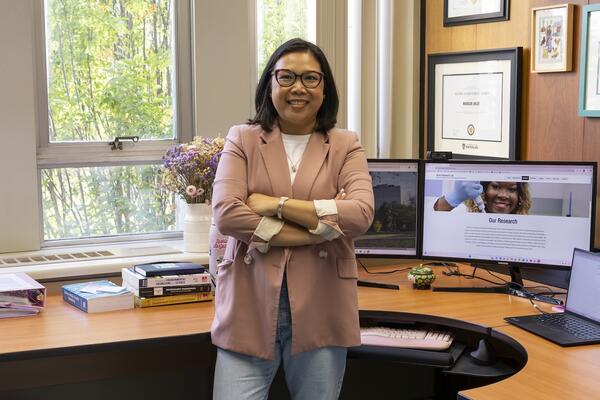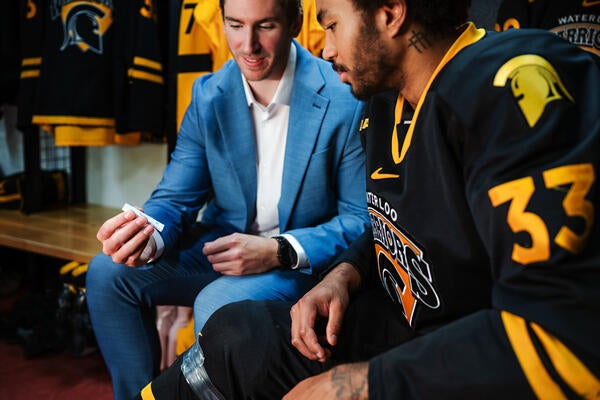
Electrical engineering alum unlocks secrets to computer technology
When it comes to lifting the veil on computer technology, Stephanie Rozek isn’t playing games. That is, unless she is.

When it comes to lifting the veil on computer technology, Stephanie Rozek isn’t playing games. That is, unless she is.
By Kira Vermond Faculty of EngineeringWhen it comes to lifting the veil on computer technology, Stephanie Rozek isn’t playing games. That is, unless she is.
Rozek, who graduated with a Waterloo electrical engineering degree in 2000, is the co-founder and CEO of Hackademy Canada, a company that demystifies technology by teaching computer game design, coding, programming, and even interactive hardware classes in the Kitchener-Waterloo region.
Although the initial business idea came out of an enthusiasm for encouraging girls and women to enter the STEM fields—science, technology, engineering and math—by the time it launched in 2013, Rozek says that focus changed.

Stephanie Rozek, left, helps a student with computing coding at Hackademy Canada, a company the electrical engineering graduate co-founded two years ago. Photo by: Brent Wettlaufer.
“We decided we didn’t want to pink-wash this. We said, ‘Let’s just be the change.’ No matter what your situation is or your challenges are, everybody is welcome. Hackademy will accommodate you,” she says.
That inclusivity has made a difference in the lives of adults, including new Canadians, who have taken day-long programming workshops. No one is turned away, even if they are unable to pay the full course fee.
There’s also CodeCrafters for children and teens, an after-school program at the downtown Kitchener museum. One attendee is an 11-year-old boy who is blind. Staff members have found ways to tailor the program for him, teaching JavaScript rather than some of the more visually-focused programs other kids use.
Rozek remembers the day she received an email from the boy’s mother asking if Hackademy could help him learn.
“I thought, ‘Here’s my challenge. We’ve been talking about access all along. Let’s actually make it work,’” she says.
Computer literacy is more important than ever with so much of school, work, play and socializing being done on a screen. Those who understand the inner workings of the devices hold power, much like those who could read hundreds of years ago, explains Rozek. Tech literacy can also lead to well-paying careers.
Rozek, a natural mover and shaker, is no stranger to creating change and making things happen. That personality trait and drive brought her to the University of Waterloo.
“I picked Waterloo because it was the best engineering school in Canada and I wanted to be surrounded by a lot of interesting people,” she says. “There are very smart people at Waterloo.”
Now Rozek is ready to launch something new to complement Hackademy’s objectives. Starting this July, she will run Year of Code Waterloo Region, a community engagement initiative that will reach out to schools, workplaces and other community areas.
The idea came out of a discussion with Communitech CEO Iain Klugman in late 2014 after she was honoured for her entrepreneurism with a K-W Oktoberfest Rogers Women of the Year award win. She says this community is the perfect place to launch Year of Code and Waterloo Engineering’s attitude toward entrepreneurism is one of the biggest reasons why.
“We always hear about barn-raising culture in this city,” she says. “And there’s truth to that. We see the result of that support in the number of companies that have come out of the Faculty and the rest of the University.”

Read more
Robots the size of a soccer ball create new visual art by trailing light that represents the “emotional essence” of music

Read more
Waterloo prof leads a team of researchers to improve water quality through a community-focused approach underpinned by technical excellence

Read more
New medical device removes the guesswork from concussion screening in contact sports using only saliva
Read
Engineering stories
Visit
Waterloo Engineering home
Contact
Waterloo Engineering
The University of Waterloo acknowledges that much of our work takes place on the traditional territory of the Neutral, Anishinaabeg, and Haudenosaunee peoples. Our main campus is situated on the Haldimand Tract, the land granted to the Six Nations that includes six miles on each side of the Grand River. Our active work toward reconciliation takes place across our campuses through research, learning, teaching, and community building, and is co-ordinated within the Office of Indigenous Relations.